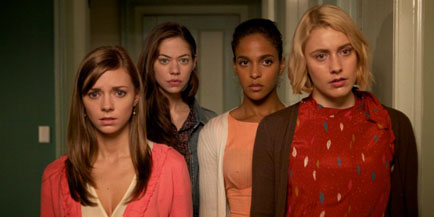Movie Review: Damsels in Distress
By Matthew Huntley
April 17, 2012
Damsels in Distress is a meant to be a satirical comedy, and while it’s heavy on the satire, it’s often too light on the comedy. Most of the time, we question writer-director Whit Stillman’s angle and wonder what he intended to underline with his colorful, albeit deadpan, characters, other than obvious social bullet points like intolerance and being judgmental. Or maybe he only wanted to have fun with the obvious and there are no deeper meanings to take away from it. If that’s the case, I suppose the movie can be enjoyed on a lighter level, but I was craving something with more edge, and certainly more laughs.
The story follows four privileged girls at the fictitious Seven Oaks University, a quiet campus in New England that’s amusingly behind the times, or at least these girls are. The leader of the pack, Violet (Greta Gerwig), is tall and blonde and speaks with the type of tone and propriety that immediately connect her to the 1950s. She’s bestowed this attitude and outlook onto her faithful followers, Heather (Carrie MacLemore) and Rose (Megalyn Echikunwoke), the latter of whom speaks with an English accent, although we’re never quite sure if it’s authentic (we have a sneaking suspicion it’s just for show).
During fall orientation, the girls spot Lily (Analeigh Tipton), a sophomore transfer student, and offer her their services. What are their services, exactly? In a way, the girls have a mission to save Seven Oaks from the 21st century, a time they feel has become associated, at least for college students, with depression and suicide, not to mention a rotten stink, both literally and figuratively. They look down on anyone who dresses sloppily and cover their noses whenever the grunge students walk by (the movie is wise not to confirm whether the girls actually smell anything). They believe they can set Lily on the right path and welcome her into their circle, although Lily doesn’t resist challenging their ideals and is amicably declared the “rebel” of the group.
Violet and her friends help run the Suicide Prevention Center and, along with wanting to prevent students from killing themselves, have ambitions to restore old-fashioned values to the campus. We suspect one of their goals may also be to empower themselves over others, specifically men. At the school’s “Roman Alphabet” fraternity parties (Greek frats have been banned from Seven Oaks), they wear formal dresses and carry purses on their arms, which, for inexplicable reasons, the men don’t find strange.
Those familiar with Stillman’s previous work will know Violet, Heather and Rose have a lot in common with the characters from his Metropolitan (1989), about a group of young, highbrow Manhattanites, also enrolled in university, who sit around and discuss social norms. Damsels doesn’t play things as straight, nor does it have as much respect for its main characters. Whereas Metropolitan made the upper class seem more dominant and mythical, here they seem outdated, even absurd.
Naturally, the girls are at odds with the other students on campus, which doesn’t seem to bother the men in their lives, who are depicted as either thick-headed buffoons or dishonest playboys. What’s ironic is the girls, in their plight to eliminate low social standards, are still attracted to the brutish males. Is Stillman subtly undermining women by suggesting that even as they strive to help cure society of its “stink” - by acting more graceful, polite and sophisticated - they’ll never be a match to the men who avoid such progression? Or is the criticism aimed more toward men, who often fail to recognize when women try to accomplish feats that are more substantive and far-reaching? Or is the movie just meant to be a humorous commentary on our jingoistic society in general? It’s hard to say because it ends on an energetic yet puzzling note, with plenty of song and dance.
Whatever Stillman’s intentions, Damsels in Distress isn’t piercing enough to be called exciting and there aren’t enough genuinely funny moments that raise the movie beyond merely average. Perhaps there is more being said than I’m leading on and the themes simply didn’t register with me. I appreciated the movie for its irreverent spirit and Doug Emmett’s vivacious cinematography, not to mention Gerwig’s carefully restrained performance, but I couldn’t quite place my finger on what I was supposed to get out of this, other than entertainment of course, but even in that department it’s lacking bite.
|
|
|
|




